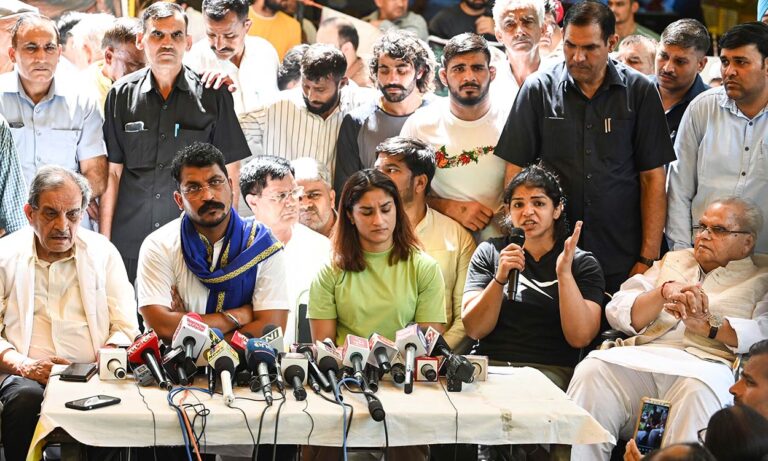#SpeakUpForWrestlers: How India’s top wrestlers unleashed their own MeToo movement nationwide

One of the most successful Olympic sports in India is wrestling. So, considering how revered and celebrated the sport is, the recent revelations of sexual abuse within the Indian Wrestling Federation have (understandably) sent shockwaves through the nation.
For years, India’s female wrestlers have faced numerous challenges, from lack of funding and infrastructure to social stigma and discrimination. Sadly, the most insidious of these challenges is the culture of harassment and abuse that plagues the sport.
However, the nation’s female wrestlers are no longer staying silent about the harassment they’ve faced within their sport. Activists and athletes alike have been actively shining a spotlight on the pervasive issue of gender-based violence within sports and have inspired a movement towards creating safer and more inclusive environments for all participants.
India’s wrestling’s #MeToo movement
In a recent article titled ‘This is the culture’: The Indian wrestlers fighting sexual abuse, Al Jazeera reported on the dark underbelly of the sport. This exposé has further ignited a powerful movement aimed at dismantling systemic abuse, empowering survivors, and demanding justice.
According to the most recent government data on crimes in the nation, India documented 31,677 cases of rape in 2021, an average of 86 per day, while over 49 registered crimes against women were reported every single hour.
The brave survivors featured in Al Jazeera have shattered the silence surrounding their traumatic experiences. Their testimonies reveal a horrifying pattern of sexual abuse perpetrated by the President of the Wrestling Federation of India (WFI), Brij Bhushan Sharan Singh.
In turn, the survivors’ stories have ignited a fire within the hearts of millions, galvanising public support and solidarity. Social media platforms have become arenas of empowerment and unity, with the hashtag #SpeakUpForWrestlers trending across the nation. Advocacy groups, athletes, and concerned citizens have joined forces, demanding accountability, institutional reforms, and a safe environment for all wrestlers.
Most female wrestlers who have come forward are from rural areas, many of them from underprivileged backgrounds. And the majority of them hail from Haryana, a North Indian state known for its high incidence of female foeticide (the process of finding out the sex of the foetus and undergoing abortion if it is a girl), and honour killings (the killing of a relative, especially a girl or woman, who is perceived to have brought dishonour on the family).
The path to justice for survivors of sexual abuse is often fraught with obstacles, especially when confronting entrenched power structures. However, the strength and resilience of the survivors, coupled with the unwavering support of the public, have set the stage for a watershed moment in Indian wrestling.
How did the #SpeakUpForWrestlers movement first start?
On 18 January 2023, about 30 top wrestlers—both male and female—began a sit-in in Delhi in protest of Singh, the WFI President.
Indian Olympian wrestler Vinesh Phogat, 28, participated in the demonstration. Speaking to Al Jazeera about the “trigger point” that led her to protest against sexual harassment of women wrestlers in the country, Phogat explained that it was her niece. She went on to add that she didn’t want to hear any more accounts of women being sexually harassed by other men.
Following this initial demonstration, on 3 May, videos surfaced from another protest in New Delhi, which was started by another group of female wrestlers. This follow-up protest was a loud statement of women being tired, after a long-standing feud between the wrestlers and the WFI, which had already been going on for several years.
The athletes behind the movement have demanded an “immediate arrest” and sought the intervention of the Supreme Court, which directed the police to register a case against 66-year-old Singh, who is also serving as Member of Parliament from Kaiserganj as a member of the Bharatiya Janata Party, and is now accused of raping seven other women as well as a minor.
Though several additional sexual harassment cases were reported in the past, Singh succeeded in either making the charges disappear or made sure the complainants did not compete again.
“They had filed a written complaint with the WFI regarding coach sexual harassment. The coach was suspended for ten days but was reinstated as head coach after seven days. This is how the WFI operates. What action will the head take against others if he is that way himself?” Phogat told Al Jazeera.
To make their voices heard, these athletes have gathered in large numbers, brandishing signs and chanting slogans. They have marched through the streets, attracting attention and support from passersby and fellow athletes alike. Some have even gone on hunger strikes in a bid to draw more attention to their cause.
All of the protesting wrestlers have opted out of ranking events and competitions, and several have threatened to take back any state-sponsored medals they may have received if quick actions are not taken against the sexual misconduct plaguing the sport.
Despite facing opposition from government officials and a minority within the wrestling community, these fighters remain steadfast in their determination to achieve their goals, hoping to represent all of the women of India in their fight for their sport, and for future generations.
As the protests continue to gain momentum, it remains to be seen whether the government will listen to the voices of these determined athletes.





